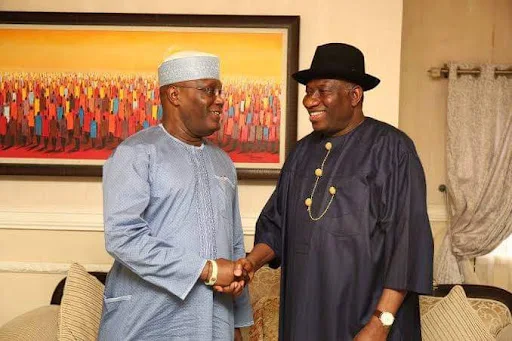As political speculation grows around the 2027 general elections, there is a push by some factions within Nigeria to revisit the past by bringing back former leaders like Atiku Abubakar and Goodluck Jonathan. This is despite the fact that the next general elections are still several years away, with President Bola Ahmed Tinubu just completing his first year in office. While Tinubu's administration has faced its share of challenges, it is premature to judge it as a failure, especially when compared to the past administrations of Atiku and Jonathan, who left Nigeria in dire straits through corruption and mismanagement.
Atiku Abubakar: Controversial Privatizations and Legislative Bribery
During his tenure as Vice President under President Olusegun Obasanjo, Atiku Abubakar played a central role in Nigeria's privatization program, which saw the sale of over 500 government investments, including the National Electric Power Authority (NEPA) and Nigerian Telecommunications Limited (NITEL). These privatizations were fraught with controversy, as they were often conducted without due process, allowing Atiku and his cronies to acquire these critical assets at a fraction of their true value—sometimes less than 5% of their original worth. Furthermore, the contracts included clauses that made it nearly impossible for the government to revoke them and obligated the government to continue funding these entities without any tangible returns.
As a result, these companies, once vital to Nigeria's economy and infrastructure, have become shadows of their former selves. Workers were laid off without benefits, and the anticipated improvements in service delivery never materialized. This period saw a significant decline in public utilities and services, and the privatization efforts were widely perceived as a ploy for personal enrichment rather than a genuine attempt to improve the nation's economy. Atiku's legacy is marred by these actions, which many see as prioritizing personal gain over national progress.
Goodluck Jonathan: A Return to Corruption and Insecurity
Equally controversial is the potential return of former President Goodluck Jonathan. His administration from 2010 to 2015 is often remembered for its deep-seated corruption, mismanagement, and insecurity. Under Jonathan's leadership, Nigeria witnessed some of its highest oil revenue inflows, yet these resources were not effectively used to develop the country. Instead, they were squandered on corrupt practices and patronage.
One of the most notorious examples of Jonathan's mismanagement was his administration's handling of the Chibok girls' kidnapping, where over 200 schoolgirls were abducted by Boko Haram militants. The government's response was lethargic and ineffective, allowing Boko Haram to strengthen its grip on the region. Additionally, the infamous “Dasuki Gate” scandal involved the diversion of billions of dollars intended for arms procurement to political campaigns, further weakening Nigeria's defense capabilities against insurgents.
Jonathan’s administration was also marked by gross financial mismanagement and widespread corruption. Figures like Sambo Dasuki, who allegedly enriched themselves overnight, became symbolic of the cronyism and favoritism that characterized Jonathan's rule. This period also saw a deterioration in Nigeria's international image, with scandals such as Diezani Alison-Madueke's alleged involvement in large-scale corruption and money laundering.
President Bola Ahmed Tinubu: A Promising Start Amid Challenges
Comparatively, President Bola Ahmed Tinubu, although only a year into his tenure, has shown a commitment to reform and development, even if his administration has faced criticism. It is still too early to deem his government a failure, especially given the deep-seated issues he inherited from previous administrations. In fact, his government has already embarked on several key reforms that, if given time to mature, could lead to significant improvements in Nigeria's socio-economic landscape.
Among these reforms is the effort to devolve more powers to local governments through local government autonomy, which aims to strengthen governance at the grassroots level and improve public service delivery. Tinubu has also prioritized education by establishing a student loans board to ease the financial burden on students and promote higher education access. In agriculture, his government has proposed an ambitious agricultural revolution plan centered around creating agricultural hubs that could enhance food security and drive economic growth.
Moreover, the establishment of the Ministry of Livestock is expected to address some of the long-standing issues in Nigeria's agricultural sector, particularly in livestock management. There is also a proposed divestment in Compressed Natural Gas (CNG) powered vehicles, which aligns with global efforts toward sustainable energy and reducing carbon emissions.
Conclusion: Moving Forward, Not Backward
As the political discourse around the 2027 elections intensifies, it is crucial for Nigerians to critically assess the track records of those vying for leadership. Atiku Abubakar's tenure as Vice President is marred by allegations of legislative bribery and controversial privatization deals that enriched a few at the expense of many. Goodluck Jonathan's presidency, meanwhile, is remembered for widespread corruption, mismanagement, and a failure to address security challenges effectively.
While President Bola Ahmed Tinubu's administration is still in its early days and has faced some criticism, it is also important to recognize the efforts being made to introduce meaningful reforms and address the country's pressing issues. It is far too early to write off Tinubu's government as a failure, especially when measured against the abysmal records of previous administrations.
The choice for Nigeria in the coming years should not be between the bad and the worse. Instead, Nigerians should focus on building a future based on integrity, competence, and a genuine commitment to national development. As the nation contemplates its future, it should reject the notion of returning to past leaders who have already had their chance and failed. The path forward must be one that breaks from the past and embraces a future of progress, stability, and growth.
Tags
News

